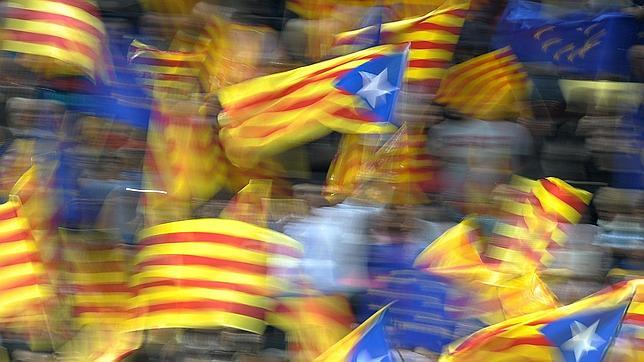19.05.2021 - 10:45
|
Actualització: 19.05.2021 - 12:45
Catalonia’s independence should be, for the third term in a row, the main objective of the new government, which will in all likelihood be formed at some point next week. The deal between Esquerra and Junts per Catalunya to share the cabinet again will see each party manage seven ministries each and confirms the former’s frontrunner, Pere Aragonès, will be the next president. The third pro-independence party, far-left CUP, while remaining in the opposition, will also back him to complete the pro-independence front.
Ever since 2015, the three parties have cooperated when it has come to seeking tself-determination in a movement that peaked in October 2017 with a referendum and a declaration of independence. During the last term, with Junts’ Quim Torra at the helm, no major progress was made in this field aside from initiating talks with the Spanish government, although these were abruptly interrupted by Covid-19 as well as internal disagreements between members of the Junts-Esquerra cabinet.
Yet, now both political groups have exchanged their roles and want to re-embark on the path to independence. They explain how they hope to achieve this in the 46-page agreement which was revealed on Monday evening.
1. Agreed referendum, not unilateral
“Only a self-determination referendum agreed with Spain can replace the democratic mandate of the 1 October [2017 unauthorized independence vote] of working to make a Catalan Republic a reality.” This is one of the key statements of the deal, implying that, despite Junts being unconvinced by the odds of persuading Madrid, the future cabinet will seek once again a vote like the one held in Scotland. The possibility of holding another unauthorized referendum, like that which took place four years ago, is nowhere in the agreement.
Both parties also are committed to joining forces to achieve an amnesty law from Spain’s Congress to see all judicial procedures revolving around the independence push dismissed, including those affecting jailed and exiled politicians and activists. Spain’s chamber’s bureau has not even accepted to consider this issue as of yet.
2. Talks with Spain alongside ‘peaceful confrontation’
Esquerra’s strategy of launching talks with the Spanish government remains in the deal, and when the new government is up and running, the Catalan parliament is expected to officially recognize the “negotiation process” with Madrid. A parliamentary committee on the issue will also be launched.
“A negotiation process with Spain is probably the most direct way and the path most equivalent to the democratic international standards to face and resolve the political conflict between Catalonia and Spain and to put an end to the repression and political persecution of the independence camp,” reads the paper.
The deal does not set a deadline for the talks and is ambiguous as to what will happen next if they fail, but it does include wording with which Junts will feel comfortable: “It is needed to keep on working firmly to be able to lay out a democratic confrontation [with Spain] that allows achieving the Catalan Republic and the independence for our country.”
3. International mediation and justice
Both parties will attempt to spark interest in the issue abroad, something they have been doing since 2015 and achieved with the 2017 referendum making headlines worldwide and president Carles Puigdemont going into exile and being able to avoid extradition.
The agreement strives to “build a favorable public opinion” abroad and to seek allies and “the possible intervention of European and international institutions to achieve an agreed referendum.”
Also, they aim to coordinate the defense in the judicial cases affecting the 2017 referendum organizers, both in Spain and internationally. This term is likely to coincide with the political prisoners taking their cases to the European Court of Human Rights and this institution having its say on their decade-long sentences.
4. Coordination
One of the issues that led to a three-month deadlock between Esquerra and Junts before a deal was confirmed was whether the Council for the Republic, an entity founded in Belgium out of the reach of Spanish control, led by Puigdemont, would have a role by helping the government on its quest to achieving independence.
In regard to coordination, the agreement states that a joint leadership including the three pro-independence parties and the two main civic associations in favor of a Catalan Republic will work on a coordinated and joint roadmap for their common goal, but without being able to veto the government’s task. This joint body will work together with the Council for the Republic until this is “reformulated” and assumes the leadership to coordinate the road to independence.
5. Possible change in strategy in 2023?
The deal does not mention any timings – yet, the far-left CUP party will be needed throughout the entire term in order to ensure the government has a majority in the chamber, and their own agreement with Esquerra mentions 2023, or mid-term, as the moment when the talks with Spain will be reviewed, and maybe ended if no progress has been made by then.
CUP’s manifesto includes a referendum in 2025 – the anti-capitalists have reluctantly agreed to engage in dialogue with Spain’s executive, but for the time being only until 2023.
Also when Aragonès’ mandate reaches its midterm, a vote of confidence on the government will take place in parliament, according to the same paper.


